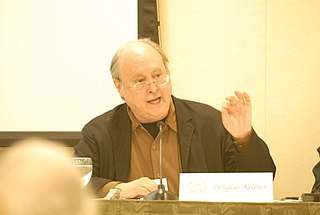
Mass media includes the diverse arrays of media that reach a large audience via mass communication.

A subculture is a group of people within a cultural society that differentiates itself from the conservative and standard values to which it belongs, often maintaining some of its founding principles. Subcultures develop their own norms and values regarding cultural, political, and sexual matters. Subcultures are part of society while keeping their specific characteristics intact. Examples of subcultures include BDSM, hippies, hipsters, goths, steampunks, bikers, punks, skinheads, gopnik, hip-hoppers, metalheads, cosplayers, otaku, otherkin, furries, and more. The concept of subcultures was developed in sociology and cultural studies. Subcultures differ from countercultures.
Media literacy is an expanded conceptualization of literacy that includes the ability to access and analyze media messages as well as create, reflect and take action, using the power of information and communication to make a difference in the world. Media literacy is not restricted to one medium and is understood as a set of competencies that are essential for work, life, and citizenship.

Stuart Henry McPhail Hall was a Jamaican-born British Marxist sociologist, cultural theorist, and political activist. Hall — along with Richard Hoggart and Raymond Williams — was one of the founding figures of the school of thought known as British Cultural Studies or the Birmingham School of Cultural Studies.
Herbert Richard Hoggart was an English academic whose career covered the fields of sociology, English literature and cultural studies, with emphasis on British popular culture.

In a society, high culture encompasses cultural objects of aesthetic value, which a society collectively esteems as being exemplary works of art, and the intellectual works of literature and music, history and philosophy, which a society considers representative of their culture.

Henry Guy Jenkins III is an American media scholar and Provost Professor of Communication, Journalism, and Cinematic Arts, a joint professorship at the University of Southern California (USC) Annenberg School for Communication and Journalism and the USC School of Cinematic Arts. He also has a joint faculty appointment with the USC Rossier School of Education. Previously, Jenkins was the Peter de Florez Professor of Humanities as well as co-founder and co-director of the Comparative Media Studies program at the Massachusetts Institute of Technology (MIT). He has also served on the technical advisory board at ZeniMax Media, parent company of video game publisher Bethesda Softworks. In 2013, he was appointed to the board that selects the prestigious Peabody Award winners.
The term middlebrow describes middlebrow art, which is easily accessible art, usually popular literature, and middlebrow people who use the arts to acquire the social capital of "culture and class" and thus a good reputation. First used in the British satire magazine Punch in 1925, the term middlebrow is the intellectual, intermediary brow between the highbrow and the lowbrow forms of culture; the terms highbrow and lowbrow are borrowed from the pseudoscience of phrenology.
The Middletown studies were sociological case studies of the white residents of the city of Muncie in Indiana initially conducted by Robert Staughton Lynd and Helen Merrell Lynd, husband-and-wife sociologists. The Lynds' findings were detailed in Middletown: A Study in Modern American Culture, published in 1929, and Middletown in Transition: A Study in Cultural Conflicts, published in 1937. They wrote in their first book:
The city will be called Middletown. A community as small as thirty-odd thousand ... [in which] the field staff was enabled to concentrate on cultural change ... the interplay of a relatively constant ... American stock and its changing environment.
The Centre for Contemporary Cultural Studies (CCCS) was a research centre at the University of Birmingham, England. It was founded in 1964 by Stuart Hall and Richard Hoggart, its first director. From 1964 to 2002, it played a critical role in developing the field of cultural studies.

In society, the term low culture identifies the forms of popular culture that have mass appeal, often broadly appealing to the middle or lower cultures of any given society. This is in contrast to the forms of high culture that appeal to a smaller, often upper-class proportion of the populace. Culture theory proposes that both high culture and low culture are subcultures within a society, because the culture industry mass-produces each type of popular culture for every socio-economic class. Despite being viewed as characteristic of less-educated social classes, low culture is still often enjoyed by upper classes as well. This makes the content that falls under this categorization the most broadly consumed kind of media in a culture overall. Various forms of low culture can be found across a variety of cultures, with the physical objects composing these mediums often being constructed from less expensive, perishable materials. The phrase low culture has come to be viewed by some as a derogatory idea in and of itself, existing to put down elements of pop or tribal culture that others may deem to be "inferior."
Children's culture includes children's cultural artifacts, children's media and literature, and the myths and discourses spun around the notion of childhood. Children's culture has been studied within academia in cultural studies, media studies, and literature departments. The interdisciplinary focus of childhood studies could also be considered in the paradigm of social theory concerning the study of children's culture.
Print culture embodies all forms of printed text and other printed forms of visual communication. One prominent scholar of print culture in Europe is Elizabeth Eisenstein, who contrasted the print culture of Europe in the centuries after the advent of the Western printing-press to European scribal culture. The invention of woodblock printing in China almost a thousand years prior and then the consequent Chinese invention of moveable type in 1040 had very different consequences for the formation of print culture in Asia. The development of printing, like the development of writing itself, had profound effects on human societies and knowledge. "Print culture" refers to the cultural products of the printing transformation.

Douglas Kellner is an American academic who works at the intersection of "third-generation" critical theory in the tradition of the Frankfurt Institute for Social Research, or Frankfurt School, and in cultural studies in the tradition of the Birmingham Centre for Contemporary Cultural Studies, or the "Birmingham School". He has argued that these two conflicting philosophies are in fact compatible. He is currently the George Kneller Chair in the Philosophy of Education in the Graduate School of Education and Information Studies at the University of California, Los Angeles.
Participatory culture, an opposing concept to consumer culture, is a culture in which private individuals do not act as consumers only, but also as contributors or producers (prosumers). The term is most often applied to the production or creation of some type of published media.
Popular culture is generally recognized by members of a society as a set of practices, beliefs, artistic output and objects that are dominant or prevalent in a society at a given point in time. Popular culture also encompasses the activities and feelings produced as a result of interaction with these dominant objects. The primary driving forces behind popular culture, especially when speaking of Western popular cultures, are the media, mass appeal, marketing and capitalism; and it is produced by what philosopher Theodor Adorno refers to as the "culture industry".

Culture is a concept that encompasses the social behavior, institutions, and norms found in human societies, as well as the knowledge, beliefs, arts, laws, customs, capabilities, and habits of the individuals in these groups. Culture is often originated from or attributed to a specific region or location.
False pleasure may be a pleasure based on a false belief, or a pleasure compared with more real, or greater pleasures. Lacan maintained that philosophers should seek to "discern not true pleasures from false, for such a distinction is impossible to make, but the true and false goods that pleasure points to".
Cultural studies is a politically engaged postdisciplinary academic field that explores the dynamics of especially contemporary culture and its social and historical foundations. Cultural studies researchers generally investigate how cultural practices relate to wider systems of power associated with, or operating through, social phenomena. These include ideology, class structures, national formations, ethnicity, sexual orientation, gender, and generation. Employing cultural analysis, cultural studies views cultures not as fixed, bounded, stable, and discrete entities, but rather as constantly interacting and changing sets of practices and processes. The field of cultural studies encompasses a range of theoretical and methodological perspectives and practices. Although distinct from the discipline of cultural anthropology and the interdisciplinary field of ethnic studies, cultural studies draws upon and has contributed to each of these fields.
Marxist cultural analysis is a form of cultural analysis and anti-capitalist cultural critique, which assumes the theory of cultural hegemony and from this specifically targets those aspects of culture which are profit driven and mass-produced under capitalism.







